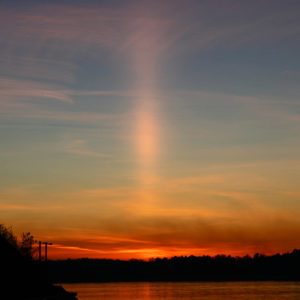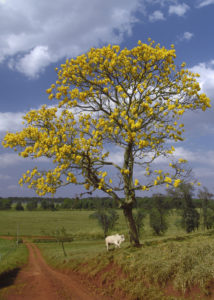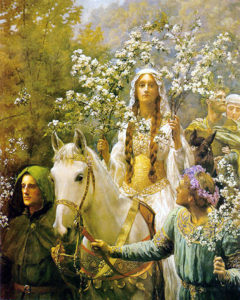Traditional reckoning of time would have us turn our thoughts toward summer tonight with Walpurgis Night and May Eve, but spring has been slow to come this year. Perhaps on this particular revolution around the sun we are better off enjoying spring now that it’s here and the daffodils, too, now that they are blooming. But this time of year is like this, isn’t it? A bit unpredictable––we never know just what it will bring.
Still, here are the things that some folks will be doing on this Walpurgis Night, this Eve of May… and perhaps you’d like to join in: They’ll be building bonfires. They’ll be drinking sparkling wine. They’ll be dining on bread and gravlax––a cured smoked salmon. Here’s what I’ll be doing: I’m stopping by the local Finnish bakery today and picking up a couple of those wonderful open-face sandwiches they make: a dark hearty Scandinavian rye, baked right there, spread with a homemade mustardy sauce then topped with sliced hard boiled eggs, smoked salmon and fresh dill, with a lemon wedge ready for squeezing. I’m getting one for me and one for Seth, and I’m getting sparkling wine to put in the fridge, just one bottle. And late Monday night, we will light a little fire in the backyard, pop open the wine, and enjoy those sandwiches in the firelight. With that, we will welcome May, and begin to turn our thoughts to summer… which is never very far away here in Lake Worth.
Though this night (named for St. Walpurga, whose feast day comes tomorrow) is a big deal in many places––particularly in Scandinavia and Northern and Eastern Europe––it’s not such a big deal here in the States. But this is our loss, and I think marking it in some small way would do us all good. Especially after a long winter. Surely there’s some sparkling wine to be found near you tonight, and as for the gravlax, well, if you served smoked fish dip and saltines, the spirit is still there. No bonfire to attend or backyard fire in the fire pit? An illuminated candle certainly will do the trick. There’s nothing wrong with simplifying celebrations if it helps us keep the day (or night, in this case).
It is a night rich in meaning, an important juncture of the year. It is a time of emerging, the opposite spoke of the wheel from Halloween, when we began our descent down, down into the earth. That juncture in late October in the Celtic tradition is known as Samhain, a Celtic cross quarter day. It marked the descent into winter, with growth happening slowly below ground, in roots. This one we come to now is known as Beltane. It marks the ascent into summer. Growth is more apparent, for it is visible and happening all around us in every budding tree and blooming flower and growing grass.
It was a few years ago on Walpurgis Night that Convivio Book of Days reader (and fellow letterpress printer) Leonard Seastone gave us a pointer in the blog comments about a good song for this night. It’s a traditional Swedish song called “Maj vare välkommen” (May Be Welcome), and that song will be part of our quiet celebration tonight, too, even if it’s just playing in my head. Leonard signed off on that Walpurgis Night using his proper Swedish name––Lennart Einar Sjösten––so he seems to me a good authority on these matters. I hope he’ll be celebrating tonight as Seth and I will be, and I hope you will, too, in some way, grand or small. Welcome May!
Image: “Nature’s own Valborgsmässoafton in Vaxholm” by Bengt Nyman. “Valborgsmässoafton“ is the Swedish name for Walpurgis Night. The photograph was shot in Vaxholm in Sweden on April 30, 2009. [Creative Commons] via Wikimedia Commons.


